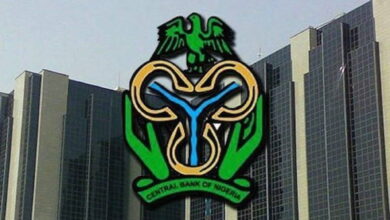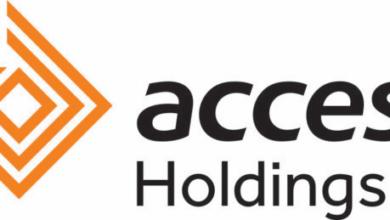Fitch Affirms Access Bank At B Rating, Says Outlook Stable

Fitch Ratings has affirmed Nigeria’s tier -1 financial institution, Access Bank Plc’s Long-Term Issuer Default Rating (IDR) at ‘B’ and Viability Rating (VR) at ‘b’, with the rating agency also stating that the bank’s Outlook is Stable.
According to the agency, the Stable Outlook reflects Fitch’s view that risks to Access’s credit profile are captured at the current rating level, with sufficient headroom, under our base case, to absorb the fallout from operating environment pressures.
Fitch also upgraded Access’ Short-term National Rating to ‘F1+(nga)’ reflecting the bank’s solid funding and liquidity profile, which is a rating strength.
Fitch added that, “IDRs and senior debt ratings of Access are driven by its intrinsic creditworthiness, as defined by its ‘b’ VR. The VR reflects the bank’s business concentration and sensitivity to Nigeria’s volatile operating environment, which are however mitigated by sound profitability and adequate capitalisation and a reasonable loss-absorption capacity.
“Access is the largest banking group in Nigeria by assets at end-1H21. Its asset quality has continued to hold up despite operating-environment pressures. Our asset-quality assessment considers substantial non-loan assets, largely comprising cash balances at the Central Bank of Nigeria (CBN; mainly in the form of restricted deposits) and investments in Nigerian government securities (B/Stable).
“Access’s net loan-to-asset ratio was a low 36 percent at end-1H21. Its impaired (IFRS 9 Stage 3) loans ratio of 4.8 percent at end-1H21 compares well with peers’, having fallen in recent years, though it remained little changed in 1H21. The reduction has reflected loan repayments, write-offs and recoveries, along with restructurings and loan growth. Total reserves coverage of impaired loans fell in 1H21, due to write-offs, but is still adequate at 69 percent, given the loans are sufficiently collateralized.
Fitch noted, “Our assessment of asset quality also captures significant Stage 2 loans (11% of gross loans at end-1H21; average reserve coverage of 6% for Stage 2 loans), which are concentrated in the oil and gas and manufacturing sectors. Its oil and gas exposure, despite deleveraging of this book, represented around 24 percent of loans at end-1H21 (sector average: 30%). Fitch deems the manufacturing industry particularly sensitive to foreign-currency (FC) shortages, due to the import reliant nature of this sector, although loan restructurings should support obligors’ repayment capacity.
“The bank has further decreased FC lending, mainly by converting those loans into local currency. Single- borrower concentrations remain high, with the top 20 loans accounting for 192 percent of Fitch Core Capital (FCC) at end-1H21.
Access’s operating profit to risk-weighted assets (RWA) is sound (end-1H21: 4.5%, up from 3.3 percent at end-2020). Profitability is a rating strength and has been supported by declining funding costs (reflecting expanding CASA deposits and a lower interest-rate environment) and increasing government securities-related interest income due to a larger securities book. As a result, the bank reported a sharp widening in its net interest margin in 1H21.”
The agency further stated that, “Nevertheless, profitability underperforms that of its highest-rated peers in Nigeria, reflecting Access’s higher funding costs, but also recent pan-African acquisitions, some of which have yet to contribute meaningfully to revenues. We expect loan-impairment charges to remain high in 2021, although lower than in 2020 when Access reported a one-off charge at its UK subsidiary. We expect an uncertain yield outlook to weigh on near-term profitability, given the bank’s sizeable securities book (20 percent of total assets).
Access’s capitalisation is adequate and broadly commensurate with the bank’s risk profile as reflected in a FCC ratio of 16.4 percent at end-1H21 (albeit below more highly rated peers’), and buffers over regulatory minimums are solid (total capital ratio of 21.3 percent versus the 15 percent regulatory minimum). Pre-impairment operating profit also provides a buffer to absorb losses through the income statement before hitting capital (1H21 annualised: equal to 7 percent of average loans).
“However, the bank’s tangible leverage ratio (end-1H21: 7.7 percent) is fairly low and below more highly-rated peers’, but should rise as foreign acquisitions begin to add to profitability. In addition, capitalisation remains sensitive to naira devaluation (via FC exposure) and credit concentrations (including among Stage 2 loans).
Access’s funding and liquidity profile is a rating strength and has strengthened as a result of the Diamond Bank acquisition. Funding costs fell further to 2.9 percent in 1H21 (2018: 5.5 percent ), reflecting an increased share of low-cost, granular CASA deposits. We believe the bank still has scope to increase this share further to a level more in line with peers’, while funding costs could also fall further as outstanding bonds are refinanced at lower rates.
The bank has reasonable overall balance-sheet liquidity but takes FC liquidity risk (and counterparty risk) through substantial currency swaps with the CBN (around USD2.4 billion, or 139 percent of FCC). Naira liquidity is supported by large cash placements (excluding restricted deposits at the CBN) and government securities. We view its FC liquidity as only adequate, notwithstanding potential liquidity available from the broader Access Bank group, in light of tight FC conditions in Nigeria.
Access’s senior unsecured debt is rated in line with the bank’s Long-Term IDR. The National Ratings of Access reflect its creditworthiness relative to that of other issuers in Nigeria. They are lower than the highest-rated Nigerian peers due to Access’s weaker profitability and capitalisation metrics. The upgrade of Access’s National Short-Term Rating to ‘F1+(nga)’ reflects the relative strength of the bank’s funding and liquidity profile, which reduces the vulnerability of the bank’s short-term local-currency obligations to default.
Access’s naira-denominated subordinated debt rating is ‘A-(nga)’, in line with the base-case notching from the VR.
On rating Sensitivities, Fitch said, “Factors that could, individually or collectively, lead to positive rating action/upgrade: An upgrade of the Long-Term IDR would require a sovereign upgrade and a strengthening in the bank’s capitalisation.
Factors that could, individually or collectively, lead to negative rating action/downgrade: A sovereign downgrade would result in a downgrade of the Long-Term IDR given that Access does not meet Fitch’s criteria to be rated above the sovereign.
A combination of an increase in the impaired loans ratio above 10 percent and/or aggressive growth at home or abroad that results in very thin buffers over regulatory capital requirements or a sharp decline in the FCC ratio.
International scale credit ratings of Financial Institutions and Covered Bond issuers have a best-case rating upgrade scenario (defined as the 99th percentile of rating transitions, measured in a positive direction) of three notches over a three-year rating horizon; and a worst-case rating downgrade scenario (defined as the 99th percentile of rating transitions, measured in a negative direction) of four notches over three years. The complete span of best- and worst-case scenario credit ratings for all rating categories ranges from ‘AAA’ to ‘D’. Best- and worst-case scenario credit ratings are based on historical performance.
On ESG Considerations, Fitch stated, “Unless otherwise disclosed in this section, the highest level of ESG credit relevance is a score of ‘3’. This means ESG issues are credit-neutral or have only a minimal credit impact on the entity, either due to their nature or the way in which they are being managed by the entity.”





